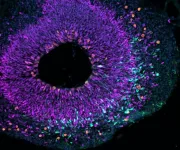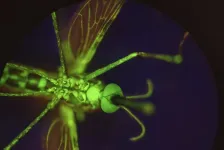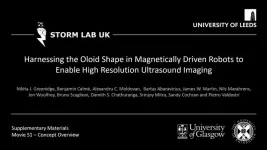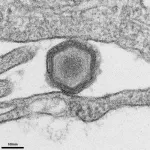(Press-News.org) In an era where data privacy concerns loom large, a new approach in artificial intelligence (AI) could reshape how sensitive information is processed.
Researchers Austin Ebel and Karthik Garimella, Ph.D students, and Assistant Professor of Electrical and Computer Engineering Brandon Reagen have introduced Orion, a novel framework that brings fully homomorphic encryption (FHE) to deep learning — allowing AI models to practically and efficiently operate directly on encrypted data without needing to decrypt it first.
The implications of this advancement, published in a recent study on arXiv and to be presented at the 2025 ACM International Conference on Architectural Support for Programming Languages and Operating Systems, are profound. FHE has long been considered the 'holy grail' of cryptography. Unlike traditional encryption, which protects data only when it is at rest or in transit, FHE allows computations to be performed on encrypted data without ever decrypting it. However, despite its promise, implementing deep learning models with FHE has been notoriously difficult due to the immense computational overhead and the technical hurdles in adapting neural networks to FHE’s bespoke programming model.
“Whenever you use online services, there are machine learning models operating in the background, collecting both your inputs and outputs,” says Garimella. “That compromises user privacy. Our goal is to bring FHE into the mainstream, and allow users to continue using the services they rely on everyday without releasing their personal, private data."
Orion tackles these challenges head-on with an automated framework that seamlessly converts deep learning models written in PyTorch into efficient FHE programs. It does so by introducing a novel method to optimize how encrypted data is structured, significantly reducing computational overhead. The framework also streamlines encryption-related processes, making it easier to manage accumulated noise and execute deep learning computations efficiently.
By employing these techniques, Orion achieves a 2.38x speedup over existing state-of-the-art methods on ResNet-20, a common benchmark model used in FHE deep learning research that is comparatively small. But perhaps most impressively, Orion enables computations on much larger networks than previously possible. The researchers demonstrated the first-ever high-resolution FHE object detection using YOLO-v1—a deep learning model with 139 million parameters, roughly 500 times larger than ResNet-20 — showcasing Orion’s ability to handle real-world AI workloads.
The code the team produced is lightweight and could be used by anyone with a basic understanding of computer science. Not only would this help in increasing the efficiency of the computations; it also makes it easily deployable across industries.
“There has been an incredible barrier to entry for people who don't want to spend months to years learning the ins and outs”, says Ebel. “With Orion, that barrier to entry is now almost non-existent.”
The development of Orion marks a critical milestone in bridging the gap between FHE and practical deep learning applications. With this framework, industries reliant on privacy — such as healthcare, finance, and cybersecurity — could leverage AI without exposing sensitive user data.
“Take online advertising,” says Reagen, who is also a member of the NYU Center for Cybersecurity. “If you want to process an individual's information in order to serve them targeted ads using neural networks, this allows service providers to analyze that data while keeping it totally confidential. For the marketers and the public, that’s a win-win scenario.”
While challenges remain in making FHE fully practical at scale, Orion brings the technology closer to widespread adoption. The research team has open-sourced the project, making it accessible to developers and researchers worldwide.
As AI continues to integrate deeper into daily life, privacy-preserving techniques like Orion could redefine the balance between innovation and security — ensuring that smarter algorithms don’t come at the cost of user privacy.
END
Encryption breakthrough lays groundwork for privacy-preserving AI models
New AI framework enables secure neural network computation without sacrificing accuracy
2025-03-26
ELSE PRESS RELEASES FROM THIS DATE:
Top global award for young technologists goes to researcher who advanced AI with high-performance computers
2025-03-26
ACM, the Association for Computing Machinery, today named Torsten Hoefler, a Professor at ETH Zurich, the recipient of the 2024 ACM Prize in Computing for fundamental contributions to high-performance computing and the ongoing AI revolution. Hoefler developed many of the core capabilities of modern supercomputers and defined key aspects of the algorithms for distributing AI models on them.
The ACM Prize in Computing recognizes early-to-mid-career computer scientists whose research contributions have fundamental impact and broad implications. ...
How did the large brain evolve?
2025-03-26
The results of the study show that the two genes act in a finely tuned interplay: one ensures that the progenitor cells of the brain multiply more, while the other causes these cells to transform into a different type of progenitor cell - the cells that later form the nerve cells of the brain. In the course of evolution, this interplay has led to the human brain being unique in its size and complexity.
The newly gained insights not only provide a deeper understanding of the evolutionary development of our brain but could also help to better comprehend how certain developmental disorders or diseases of the brain arise. ‘Our findings deepen the fundamental ...
Rare disease drug nitisinone makes human blood deadly to mosquitoes
2025-03-26
In the fight against malaria, controlling the mosquito population is crucial.
Several methods are currently used to reduce mosquito numbers and malaria risk. One of these includes the antiparasitic medication ivermectin. When mosquitoes ingest blood containing ivermectin, it shortens the insect’s lifespan and helps decrease the spread of malaria.
However, ivermectin has its own issues. Not only is it environmentally toxic, but also, when it is overused to treat people and animals with worm ...
Mini rolling robot takes virtual biopsies
2025-03-26
Embargoed: Not for Release Until 2pm U.S. Eastern Time (6pm GMT) Wednesday, 26 March 2025
With images and videos
A tiny magnetic robot which can take 3D scans from deep within the body, that could revolutionise early cancer detection, has been developed by researchers.
The team, led by engineers from the University of Leeds, say this is the first time it has been possible to generate high-resolution three-dimensional ultrasound images taken from a probe deep inside the gastrointestinal ...
Researchers design tools to develop vaccines more efficiently for African swine fever virus (ASFV)
2025-03-26
Rockville, Maryland—March 26, 2024—Researchers from the J. Craig Venter Institute (JCVI), the Friedrich-Loeffler-Institut (FLI), and the International Livestock Research Institute (ILRI) have developed a reverse genetics system for African swine fever virus (ASFV). This new system will aid researchers in developing vaccines and in studying the pathogenesis and biology of ASFV, a highly contagious, deadly viral disease affecting domesticated and wild pigs, especially prevalent in Africa, Europe, Asia, and the Caribbean. A recent study estimates if ASFV reached the United States it could result ...
How survivors spanned the globe after Earth’s biggest mass extinction
2025-03-26
Scientists don’t call it the “Great Dying” for nothing. About 252 million years ago, upward of 80% of all marine species vanished during the end-Permian mass extinction – the most extreme event of its kind in Earth’s history.
What followed was a mysterious, multimillion-year span that could be called the “Great Dulling,” when marine animal communities looked remarkably alike all over the planet, from the equator to the poles. Researchers have long sought an explanation for this so-called taxonomic homogenization – a scene that played out after other mass extinctions over the past ...
Even in egalitarian Sweden, a "culture of silence" may prevent university staff and students from reporting sexual harassment
2025-03-26
Even in egalitarian Sweden, a "culture of silence" may prevent university staff and students from reporting sexual harassment, with just an 8.1% reporting rate for students who had experienced either rape or attempted rape.
####
Article URL: https://plos.io/4bW0elh
Article title: What determines the ‘culture of silence’? Disclosing and reporting sexual harassment among university employees and students at a large Swedish public university
Author countries: Sweden
Funding: This work was funded by the Swedish Research Council, ...
Data from the Healthy Minds Study of 140 college campuses in the US suggests that religiousness may be protective against symptoms of depression in students, although less so in sexual minorities
2025-03-26
Data from the Healthy Minds Study of 140 college campuses in the US suggests that religiousness may be protective against symptoms of depression in students, although less so in sexual minorities.
####
Article URL: https://plos.io/3XwiyM6
Article Title: Religiousness, sexual orientation, and depression among emerging adults in U.S. higher education: Findings from the Healthy Minds Study
Author Countries: Spain, United Kingdom, United States
Funding: The authors received no specific funding for this work. END ...
Idaho National Laboratory seeks sponsor for innovation incubator to support technology commercialization
2025-03-26
(IDAHO FALLS, Idaho) – The Idaho National Laboratory (INL) is seeking an industry sponsor to invest $5 million to $10 million in a privately funded innovation incubator. This program will combine the power of a national laboratory with private sector commercialization knowledge to unleash breakthrough innovations by finding and supporting promising startups in the areas of nuclear energy, integrated energy systems, cybersecurity and advanced materials.
The innovation incubator seeks to provide seed-stage startups aligned ...
Ochsner Health celebrates team members recognized as Louisiana State Nurses Association 40 Under 40 honorees
2025-03-26
NEW ORLEANS – Four outstanding Ochsner Health nurses have been named to the Louisiana State Nurses Association’s (LSNA) second annual 40 Under 40 list.
The LSNA 40 Under 40 list celebrates 40 future leaders of nursing in Louisiana who are 40 years of age and under, exemplify dedication to the nursing profession, and demonstrate exceptional leadership qualities.
“We are immensely proud of our Ochsner honorees. This recognition celebrates our nurses who fuel their purpose each day and use their voice to influence the growth of the nursing profession and how we deliver high-quality care to our patients and communities,” said Tiffany Murdock, senior ...
LAST 30 PRESS RELEASES:
Trapping light on thermal photodetectors shatters speed records
New review highlights the future of tubular solid oxide fuel cells for clean energy systems
Pig farm ammonia pollution may indirectly accelerate climate warming, new study finds
Modified biochar helps compost retain nitrogen and build richer soil organic matter
First gene regulation clinical trials for epilepsy show promising results
Life-changing drug identified for children with rare epilepsy
Husker researchers collaborate to explore fear of spiders
Mayo Clinic researchers discover hidden brain map that may improve epilepsy care
NYCST announces Round 2 Awards for space technology projects
How the Dobbs decision and abortion restrictions changed where medical students apply to residency programs
Microwave frying can help lower oil content for healthier French fries
In MS, wearable sensors may help identify people at risk of worsening disability
Study: Football associated with nearly one in five brain injuries in youth sports
Machine-learning immune-system analysis study may hold clues to personalized medicine
A promising potential therapeutic strategy for Rett syndrome
How time changes impact public sentiment in the U.S.
Analysis of charred food in pot reveals that prehistoric Europeans had surprisingly complex cuisines
As a whole, LGB+ workers in the NHS do not experience pay gaps compared to their heterosexual colleagues
How cocaine rewires the brain to drive relapse
Mosquito monitoring through sound - implications for AI species recognition
UCLA researchers engineer CAR-T cells to target hard-to-treat solid tumors
New study reveals asynchronous land–ocean responses to ancient ocean anoxia
Ctenophore research points to earlier origins of brain-like structures
Tibet ASγ experiment sheds new light on cosmic rays acceleration and propagation in Milky Way
AI-based liquid biopsy may detect liver fibrosis, cirrhosis and chronic disease signals
Hope for Rett syndrome: New research may unlock treatment pathway for rare disorder with no cure
How some skills become second nature
SFU study sheds light on clotting risks for female astronauts
UC Irvine chemists shed light on how age-related cataracts may begin
Machine learning reveals Raman signatures of liquid-like ion conduction in solid electrolytes
[Press-News.org] Encryption breakthrough lays groundwork for privacy-preserving AI modelsNew AI framework enables secure neural network computation without sacrificing accuracy





